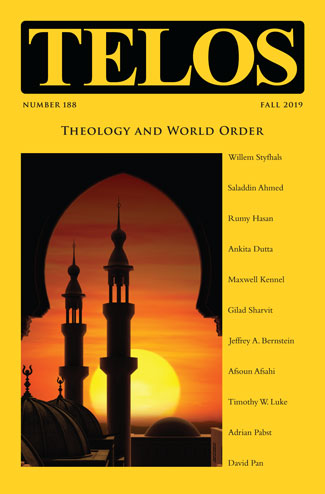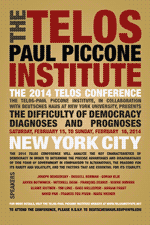By David Pan · Monday, September 9, 2019 Telos 188 (Fall 2019): Theology and World Order is now available for purchase in our store. Individual subscriptions to Telos are also available in both print and online formats.
 It would be naive to consider the question of global political order without engaging in debates about theology. Not only has it become clear that religious conflicts drive political ones, the very attempt to move “beyond” religion must be understood in terms of its theological meaning. The postsecular turn has not meant a return to religion so much as a realization that secularization was never a turn away from religion in the first place but rather itself a specific theological alternative among many. Accordingly, if our deepest political conflicts arise as consequences of theological disputes, we must address theology directly in order to get to the roots of major conflicts. Not only clear cases, such as conflicts between Israelis and Palestinians or between Shiite and Sunni Muslims, but also those between the United States and China revolve around theological issues that shape political and military conflict. Yet, our current approaches rely on political scientific and military calculations that have not yet been able to evaluate theology as a key and deciding factor in such conflicts. As the U.S. military and intelligence agencies debate the threat that Islamic State poses in Afghanistan, for instance, a key consideration should be the character and prospects of Islamic State’s theology, as well as the broader question of the role of theology in deciding political conflict. This issue of Telos engages in this discussion by considering how conceptions of world order arise from specific theologies. It would be naive to consider the question of global political order without engaging in debates about theology. Not only has it become clear that religious conflicts drive political ones, the very attempt to move “beyond” religion must be understood in terms of its theological meaning. The postsecular turn has not meant a return to religion so much as a realization that secularization was never a turn away from religion in the first place but rather itself a specific theological alternative among many. Accordingly, if our deepest political conflicts arise as consequences of theological disputes, we must address theology directly in order to get to the roots of major conflicts. Not only clear cases, such as conflicts between Israelis and Palestinians or between Shiite and Sunni Muslims, but also those between the United States and China revolve around theological issues that shape political and military conflict. Yet, our current approaches rely on political scientific and military calculations that have not yet been able to evaluate theology as a key and deciding factor in such conflicts. As the U.S. military and intelligence agencies debate the threat that Islamic State poses in Afghanistan, for instance, a key consideration should be the character and prospects of Islamic State’s theology, as well as the broader question of the role of theology in deciding political conflict. This issue of Telos engages in this discussion by considering how conceptions of world order arise from specific theologies.
Continue reading →
By Simon Ravenscroft · Tuesday, March 22, 2016 This essay explores the theological and philosophical underpinnings of the work of the radical Catholic social theorist Ivan Illich (1926–2002), via a discussion of the changing meaning of charity in Western thought and practice. It is argued that Illich’s thought is animated by a traditional theological understanding of charity as anchored in local, personal bonds and networks of reciprocity, and that his critique of Western economic modernity has much to do with the gradual depersonalization and institutionalization of charity, theoretically and in society, linked to its transmogrification into “abstract” philanthropy. Drawing on debates around the nature of love and the gift in contemporary theology, philosophy, and social anthropology, the conceptual dynamics of Illich’s account of human sociality are made clear.
Continue reading →
By Matthew Bagot · Monday, May 5, 2014 The following paper was originally prepared for the Eighth Annual Telos Conference, held on February 15–16, 2014, in New York City.
 In this paper, I will try to show the positive potential of religion for democracy in light of some theoretical and practical considerations. At the theoretical level, a debate on the proper relation of religion to politics has taken place between certain “liberal” political theorists who are suspicious of religion for good historical reasons and a number of Christian authors who argue that religion can enrich our public life.[1] One such author, David Hollenbach, S.J., bases his argument on an approach to the common good—defined in Catholic teaching as “the sum of those conditions of social life which allow social groups and their individual members relatively thorough and ready access to their own fulfillment”[2]—that he discerns at the Second Vatican Council (1962–65) and calls “dialogic universalism.”[3] In this paper, I will try to show the positive potential of religion for democracy in light of some theoretical and practical considerations. At the theoretical level, a debate on the proper relation of religion to politics has taken place between certain “liberal” political theorists who are suspicious of religion for good historical reasons and a number of Christian authors who argue that religion can enrich our public life.[1] One such author, David Hollenbach, S.J., bases his argument on an approach to the common good—defined in Catholic teaching as “the sum of those conditions of social life which allow social groups and their individual members relatively thorough and ready access to their own fulfillment”[2]—that he discerns at the Second Vatican Council (1962–65) and calls “dialogic universalism.”[3]
Continue reading →
|
|
 It would be naive to consider the question of global political order without engaging in debates about theology. Not only has it become clear that religious conflicts drive political ones, the very attempt to move “beyond” religion must be understood in terms of its theological meaning. The postsecular turn has not meant a return to religion so much as a realization that secularization was never a turn away from religion in the first place but rather itself a specific theological alternative among many. Accordingly, if our deepest political conflicts arise as consequences of theological disputes, we must address theology directly in order to get to the roots of major conflicts. Not only clear cases, such as conflicts between Israelis and Palestinians or between Shiite and Sunni Muslims, but also those between the United States and China revolve around theological issues that shape political and military conflict. Yet, our current approaches rely on political scientific and military calculations that have not yet been able to evaluate theology as a key and deciding factor in such conflicts. As the U.S. military and intelligence agencies debate the threat that Islamic State poses in Afghanistan, for instance, a key consideration should be the character and prospects of Islamic State’s theology, as well as the broader question of the role of theology in deciding political conflict. This issue of Telos engages in this discussion by considering how conceptions of world order arise from specific theologies.
It would be naive to consider the question of global political order without engaging in debates about theology. Not only has it become clear that religious conflicts drive political ones, the very attempt to move “beyond” religion must be understood in terms of its theological meaning. The postsecular turn has not meant a return to religion so much as a realization that secularization was never a turn away from religion in the first place but rather itself a specific theological alternative among many. Accordingly, if our deepest political conflicts arise as consequences of theological disputes, we must address theology directly in order to get to the roots of major conflicts. Not only clear cases, such as conflicts between Israelis and Palestinians or between Shiite and Sunni Muslims, but also those between the United States and China revolve around theological issues that shape political and military conflict. Yet, our current approaches rely on political scientific and military calculations that have not yet been able to evaluate theology as a key and deciding factor in such conflicts. As the U.S. military and intelligence agencies debate the threat that Islamic State poses in Afghanistan, for instance, a key consideration should be the character and prospects of Islamic State’s theology, as well as the broader question of the role of theology in deciding political conflict. This issue of Telos engages in this discussion by considering how conceptions of world order arise from specific theologies.  In this paper, I will try to show the positive potential of religion for democracy in light of some theoretical and practical considerations. At the theoretical level, a debate on the proper relation of religion to politics has taken place between certain “liberal” political theorists who are suspicious of religion for good historical reasons and a number of Christian authors who argue that religion can enrich our public life.[1] One such author, David Hollenbach, S.J., bases his argument on an approach to the common good—defined in Catholic teaching as “the sum of those conditions of social life which allow social groups and their individual members relatively thorough and ready access to their own fulfillment”[2]—that he discerns at the Second Vatican Council (1962–65) and calls “dialogic universalism.”[3]
In this paper, I will try to show the positive potential of religion for democracy in light of some theoretical and practical considerations. At the theoretical level, a debate on the proper relation of religion to politics has taken place between certain “liberal” political theorists who are suspicious of religion for good historical reasons and a number of Christian authors who argue that religion can enrich our public life.[1] One such author, David Hollenbach, S.J., bases his argument on an approach to the common good—defined in Catholic teaching as “the sum of those conditions of social life which allow social groups and their individual members relatively thorough and ready access to their own fulfillment”[2]—that he discerns at the Second Vatican Council (1962–65) and calls “dialogic universalism.”[3] 






